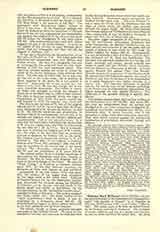

Clement Mary Hofbauer (JOHN DVOHAK), Saint, the second founder of the Redemptorist Congregation, called “the Apostle of Vienna“, b. at Tascwitz in Moravia, December 26, 1751; d. at Vienna, March 15, 1821. The family name of Dvolak was better known by its German equivalent, Hofbauer. The youngest of twelve children, and son of a grazier and butcher, he was six years old when his father died. His great desire was to become a priest, but his family being unable to give him the necessary education he became a baker’s assistant, devoting all his spare time to study. He was a servant in the Premonstratensian monastery of Bruck from 1771 to 1775, and then lived for some time as a hermit. When the Emperor Joseph II abolished hermitages he went to Vienna, where he worked once more as a baker. After two pilgrimages to Rome he again tried a hermit’s life (1782-3), this time under the protection of Barnaba Chiaramonti, Bishop of Tivoli, afterwards Pope Pius
VII, taking the name of Clement, by which he was ever afterwards known. He once more returned to Vienna, where at length by the generosity of benefactors he was enabled to go to the university and complete his studies. In 1784 he made a third pilgrimage on foot to Rome with a friend, Thaddaus Hubl, and the two were received into the Redemptorist novitiate at San Giuliano on the Esquiline. After a shortened probation they were professed on March 19, 1785, and ordained priests a few days later. They were sent, towards the end of the same year, to found a house north of the Alps, St. Alphonsus, who was still alive, prophesying their success. It being impossible under Joseph II to found a house in Vienna, Clement and Thaddaus turned to Warsaw, where King Stanislaus
Poniatowski, at the nuncio’s request, placed St. Benno’s, the German national church, at their disposal. Here. in 1795, they saw the end of Polish independence. The labors of Clement and his companions in Warsaw from 1786 to 1808 are well nigh incredible. In addition to St. Benno’s, another large church was reserved for them, where sermons were preached in French, and there were daily classes of instruction for Protestants and Jews. Besides this Clement founded an orphanage and a school for boys.
His chief helper, Thaddaus Hubl, died in 1807. In the next year, on orders from Paris, the house at Warsaw and three other houses which Clement had founded were suppressed, and the Redemptorists were expelled from the Grand Duchy. Clement with one companion went to Vienna, where for the last twelve years of his life he acted as chaplain and director at an Ursuline convent. During these years he exercised a veritable apostolate among all classes in the capital from the Emperor Francis downward. Unable to found a regular house of his congregation, which was however established, as he had predicted, almost immediately after his death, he devoted himself in a special way to the conversion and training of young men. “I know but three men of superhuman energy”, his friend Werner had said, “Napoleon, Goethe, and Clement Hofbauer.” “Religion in Austria”, said Pius VII, “has lost its chief support.” Indeed it was to Clement Hofbauer perhaps more than to any single individual that the extinction of Josephinism was due. He was beatified by Leo XIII, January 29, 1888; canonized May 20, 1909.
J. MAGNIER

